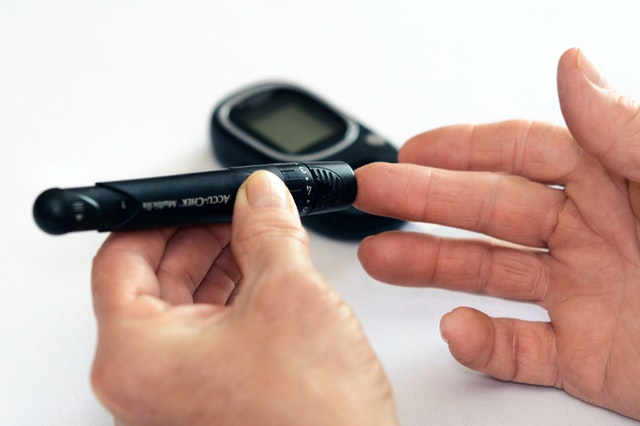What are the high risks in pregnancy?
Ever been told you have high risks pregnancy? What does that mean? That sounds pretty scary, but because you are high risk, you and your baby will be closely monitored by maternal-fetal medicine specialists.
They provide education and research concerning the most recent approaches and treatments for obstetrical problems. You may be considered high risk if you are younger than 17 or older than 35 have diabetes, are carrying more than one baby, have kidney disease or high blood pressure.
But just because you are labeled high risk doesn't mean you can't deliver a healthy baby. Working with a maternal-fetal medicine specialist will help give you and your baby the best outcome and surpass the "Goliath", high risks in pregnancy.
The biggest joy comes from taking a mom with multiple complications through pregnancy and getting them through to their delivery and seeing a positive outcome. Doctors normally much as a team to care for the expecting mother and meet their needs and collaborate with each other to provide the best outcome for the mom and the baby.
High risks in pregnancy require special attention and proper care and management throughout the entire pregnancy to avoid unnecessary and unexpected surprises. In this post we look at the following common high risks in pregnancy in detail :
Being Pregnant With Multiples.
Being pregnant with multiples is considered to be a high-risk pregnancy for multiple reasons. These can include that moms are at a higher risk for complications such as preeclampsia, preterm labor and growth problems for the babies.
When a mom is pregnant with multiples, the doctors will likely start close monitoring her at about the 12th week of pregnancy and doing so also helps to establish the appropriate due date for the mom as well as get her set on a schedule for all the appropriate testing and evaluation that a mom with multiples will need during the pregnancy.
For moms who have twins or higher, special and additional prenatal care above those women who are experiencing a lower risk pregnancy s needed. Often the moms get more frequent and additional ultrasounds as well as additional monitoring for some of the complications that can come about when a mom is pregnant with more than one baby.
The important aspect of twins is there are either identical twins or fraternal twins. Identical twins started from one egg and end up splitting into twins and in that particular setting, they may have many more complications during their pregnancy and require much more intensive monitoring.
Fraternal twins or dichorionic twins are two separate eggs and their complications are less likely but still have a high risk of premature labor, growth restriction and diabetes.
In addition to providing moms of multiples the time that they need at clinic visits to discuss some of the complications that can occur with their pregnancies, there's always a need to also provide nutritional counseling for the expecting mother who needs an increase in caloric intake and protein intake among other nutrients.
For any woman who is delivering twins, its recommended epidural anesthesia during delivery. For any woman who was pregnant with triplets or above, C-section is nearly always recommended for delivery to avoid unexpected other high risks in pregnancy or rather birthing complications.
High blood pressure or hypertension.
High blood pressure or hypertension has taken the lives of millions of people around the world because it has been taken for granted in previous years. High blood pressure gained the reputation of being a silent killer because it usually doesn't bring any symptoms while doing the damage and for a pregnant mother surely special monitoring is required.
Maintaining healthy blood pressure is very important to maintain health and enhanced overall well-being. High blood pressure is not listed as a high risks in pregnancy for fun. Blood pressure is the force that is exerted by circulating blood on the walls of the blood vessels.
It is typical for blood pressure to fluctuate throughout the day, but if it stays high, then the high blood pressure is experienced. The medical term for high blood pressure commonly and frequently used is hypertension. Medical experts agree that normal blood pressure is between 110/70 and 125/80.
When blood pressure is high, it may damage the blood vessels, heart, and kidneys. These conditions may lead to heart attack, stroke, and other serious problems. Hypertension is often called a “silent killer” because it does not cause symptoms while causing the said damages.
About 90-95 percent of the causes of hypertension are unknown. But several factors may lead to one getting high blood pressure. These conditions include: obesity, excessive alcohol consumption, family background of high blood pressure, eating too much salt, and old age.
 For pregnancies, old age isn't really a common factor since by old age most in not all women would have reached menopause. One's blood pressure may also rise if he or she lives a sedentary lifestyle and is not eating sufficient potassium and calcium.
For pregnancies, old age isn't really a common factor since by old age most in not all women would have reached menopause. One's blood pressure may also rise if he or she lives a sedentary lifestyle and is not eating sufficient potassium and calcium.
Hardening of the arteries (arteriosclerosis) or thickening of the artery wall and too much contraction of the small arteries may also cause hypertension.
High blood pressure does not usually cause symptoms that is why this ailment can go undetected for many years. This may result in progressive damage to major organs like the heart, kidneys, liver, and blood vessels.
In addition to these conditions, high blood pressure can cause the tiny capillaries in the eye to bleed. However, symptoms of high blood pressure are noticeable in some people. These symptoms may include headache, blurred vision, nausea, and chronic fatigue.
Treatment for high blood pressure depends on how high the blood pressure is. Health conditions like diabetes, or whether any organs have been damaged are critical in treating high blood pressure.
Individuals with high blood pressure may lower their blood pressure by making healthy changes in their daily activities and food regimens. Medication can be taken if those lifestyle changes don't work.
Diabetes, One Major High Risks in Pregnancy.
Diabetes and pregnancy is a very common entity that affects many women in pregnancy. This is because some women have diabetes prior to pregnancy and some develop diabetes in pregnancy. In most cases, the expecting mother may develop gestational diabetes and then if they have pre-existing diabetes then regular assistance is needed in managing their pre-existing diabetes.
Doctors commonly perform a diabetes glucose challenge test at approximately 26 to 28 weeks if that testing is abnormal. A patient is diagnosed with diabetes in pregnancy. The complications that occur most commonly with gestational diabetes is either small or large babies as well as hypertension and they are even at risk for stillbirth if not well controlled.
For women who have gestational diabetes, 98% of the time it goes away completely as soon as they deliver their baby. However, those women are more at risk for developing type two diabetes later in life, so at the patient's six-week checkup, its always important to do some testing to see if the diabetes has resolved and then every three years they should get tested for diabetes specifically related to moms that have diabetes prior to pregnancy.
Those babies are at risk for not only the complications that can occur with gestational diabetes and they're at increased risk depending on the mom's control prior to pregnancy for congenital defects.
So we evaluate moms in the first trimester and try to get them under the best control and then serially through ultrasound and other testing, evaluate them to make sure that their age as well as their babies are in their best control and safest during pregnancy.
We have diabetes educators here that are nurses and dieticians and we're especially trained in working with people who have diabetes. We help the patients in terms of different nutrition needs during pregnancy.
We help them with physical activity, which helps to use their glucose and help manage their blood sugars during pregnancy so that we keep the blood sugars in very tight control during their pregnancy for a healthy outcome with their pregnancy and their baby.











No comments:
Post a Comment